| Listing 1 - 10 of 19 | << page >> |
Sort by
|

ISBN: 3518583271 9783518583272 Year: 2002 Volume: 7 Publisher: Frankfurt am Main Suhrkamp
Abstract | Keywords | Export | Availability | Bookmark
 Loading...
Loading...Choose an application
- Reference Manager
- EndNote
- RefWorks (Direct export to RefWorks)
Metaphysics --- Ontology. --- Dialectic --- Ontology --- Being --- Philosophy --- Necessity (Philosophy) --- Substance (Philosophy) --- Polarity --- Polarity (Philosophy)
Article
Abstract | Keywords | Export | Availability | Bookmark
 Loading...
Loading...Choose an application
- Reference Manager
- EndNote
- RefWorks (Direct export to RefWorks)
Expression. --- Mouse. --- Olfactory bulb. --- Olfactory. --- Polarity. --- Sensory. --- Zif268.
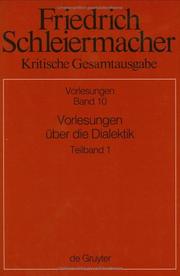
ISBN: 3110172097 3110171295 311090327X 3111799042 3111801721 3110892618 9783110172096 9783110171297 Year: 2002 Volume: 11 Publisher: Berlin de Gruyter
Abstract | Keywords | Export | Availability | Bookmark
 Loading...
Loading...Choose an application
- Reference Manager
- EndNote
- RefWorks (Direct export to RefWorks)
Critical edition of Schleiermacher's Vorlesungen über die Dialektik in two volumes: The first volume (10/1) presents a historical introduction, an editorial report and Schleiermacher's manuscripts (1811–1833); the second volume (10/2) contains selected transcripts of the lectures 1811, 1818/19, and 1822 together with an appendix with special notes, bibliography, and an index. This is the first ever publication of the complete transcripts of his lectures from 1811 and 1818/19, presented here in a critical edition. The recently discovered (anonymous) transcript of the lecture from 1818/19 deserves special attention because of its precise and complete account of the lecture. With the publication of these volumes, researchers now have access to a complete historical critical edition of the Dialektik, broadening at the same time the text base and complementing previous editions. Kritische Edition von Schleiermachers Vorlesungen über die Dialektik in zwei Teilbänden: Der erste Band (10/1) enthält neben Historischer Einführung und Editorischem Bericht die Manuskripte Schleiermachers aus den Jahren 1811 bis 1833, während der zweite Band (10/2) ausgewählte Vorlesungsnachschriften zu den Kollegien 1811, 1818/19 und 1822 und als Anhang das Sondergut sowie Literaturverzeichnis und Register bietet. Vollständige Nachschriften zu den Vorlesungen 1811 und 1818/19 werden hier erstmals ediert, wobei der (anonymen) Nachschrift zum Kolleg 1818/19, die erst jüngst bekannt geworden ist, aufgrund ihrer ausführlichen und präzisen Wiedergabe der Vorlesung besondere Bedeutung zukommt. Mit dieser Edition verfügt die Forschung erstmals über eine vollständige historisch-kritische Ausgabe der Dialektik, die zudem die Textbasis gegenüber bisherigen Editionen beträchtlich erweitert.
Philosophy. --- Philosophy, Ancient. --- Theology, Doctrinal. --- Dialectic. --- Logic. --- Argumentation --- Deduction (Logic) --- Deductive logic --- Dialectic (Logic) --- Logic, Deductive --- Intellect --- Philosophy --- Psychology --- Science --- Reasoning --- Thought and thinking --- Polarity --- Polarity (Philosophy) --- Methodology
Book
ISBN: 2747533379 Year: 2002 Publisher: Paris : L'Harmattan,
Abstract | Keywords | Export | Availability | Bookmark
 Loading...
Loading...Choose an application
- Reference Manager
- EndNote
- RefWorks (Direct export to RefWorks)
Interdisciplinary approach to knowledge. --- Polarity (Philosophy). --- Humanities --- Interdisciplinarité --- Contraires (Logique) --- Sciences humaines --- Methodology. --- Méthodologie
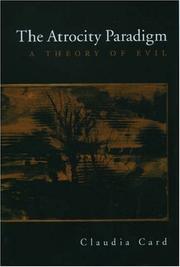
ISBN: 0195145089 0195181263 0199881790 1280531746 9786610531745 0198033141 1423763351 0199833117 Year: 2002 Publisher: Oxford Oxford university press
Abstract | Keywords | Export | Availability | Bookmark
 Loading...
Loading...Choose an application
- Reference Manager
- EndNote
- RefWorks (Direct export to RefWorks)
Noted philosopher and feminist Claudia Card presents a workable theory of evil, examining in particulat human atrocities - acts of cruelty committed by human beings on others.
Good and evil --- Evil --- Wickedness --- Ethics --- Philosophy --- Polarity --- Religious thought --- Evil in motion pictures --- Good and evil. --- General ethics
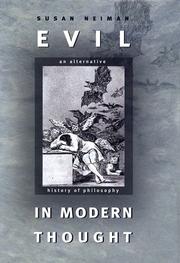
ISBN: 0691096082 1400873665 1400825199 Year: 2002 Publisher: Princeton (N.J.): Princeton university press
Abstract | Keywords | Export | Availability | Bookmark
 Loading...
Loading...Choose an application
- Reference Manager
- EndNote
- RefWorks (Direct export to RefWorks)
Evil threatens human reason, for it challenges our hope that the world makes sense. For eighteenth-century Europeans, the Lisbon earthquake was manifest evil. Today we view evil as a matter of human cruelty, and Auschwitz as its extreme incarnation. Examining our understanding of evil from the Inquisition to contemporary terrorism, Susan Neiman explores who we have become in the three centuries that separate us from the early Enlightenment. In the process, she rewrites the history of modern thought and points philosophy back to the questions that originally animated it. Whether expressed in theological or secular terms, evil poses a problem about the world's intelligibility. It confronts philosophy with fundamental questions: Can there be meaning in a world where innocents suffer? Can belief in divine power or human progress survive a cataloging of evil? Is evil profound or banal? Neiman argues that these questions impelled modern philosophy. Traditional philosophers from Leibniz to Hegel sought to defend the Creator of a world containing evil. Inevitably, their efforts--combined with those of more literary figures like Pope, Voltaire, and the Marquis de Sade--eroded belief in God's benevolence, power, and relevance, until Nietzsche claimed He had been murdered. They also yielded the distinction between natural and moral evil that we now take for granted. Neiman turns to consider philosophy's response to the Holocaust as a final moral evil, concluding that two basic stances run through modern thought. One, from Rousseau to Arendt, insists that morality demands we make evil intelligible. The other, from Voltaire to Adorno, insists that morality demands that we don't. Beautifully written and thoroughly engaging, this book tells the history of modern philosophy as an attempt to come to terms with evil. It reintroduces philosophy to anyone interested in questions of life and death, good and evil, suffering and sense. Featuring a substantial new afterword by Neiman that raises provocative questions about Hannah Arendt's take on Adolf Eichmann and the rationale behind the Hiroshima bombing, this Princeton Classics edition introduces a new generation of readers to this eloquent and thought-provoking meditation on good and evil, life and death, and suffering and sense.
Good and evil --- -Philosophy, Modern --- Modern philosophy --- Evil --- Wickedness --- Ethics --- Philosophy --- Polarity --- Religious thought --- Evil in motion pictures --- History --- Philosophy, Modern. --- History. --- Philosophy, Modern
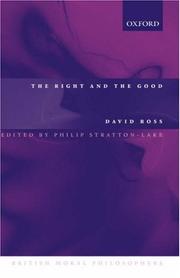
ISBN: 0199252653 0199252645 9780199252657 019159833X 9786611930547 1281930547 0191530964 9780191530968 9780191598333 9780199252640 Year: 2002 Publisher: Oxford Clarendon Press
Abstract | Keywords | Export | Availability | Bookmark
 Loading...
Loading...Choose an application
- Reference Manager
- EndNote
- RefWorks (Direct export to RefWorks)
The Right and the Good, a classic of twentieth-century philosophy by the great scholar Sir David Ross, is now presented in a new edition with a substantial introduction by Philip Stratton-Lake, a leading expert on Ross. Ross's book is the pinnacle of ethical intuitionism, which was the dominant moral theory in British philosophy for much of the nineteenth and early twentieth century. Intuitionism is now enjoying a considerable revival, and Stratton-Lakeprovides the context for a proper understanding of Ross's great work today.
Good and evil --- Right and wrong --- Wrong and right --- Ethics --- Immorality --- Evil --- Wickedness --- Philosophy --- Polarity --- Religious thought --- Good and evil. --- Right and wrong.

ISBN: 0719059569 9780719059568 Year: 2002 Publisher: Manchester Manchester University Press
Abstract | Keywords | Export | Availability | Bookmark
 Loading...
Loading...Choose an application
- Reference Manager
- EndNote
- RefWorks (Direct export to RefWorks)
Kane, Sarah --- Dramatists, English --- Playwriting. --- Polarity in literature. --- Women and literature --- History --- Playwriting --- Polarity in literature --- Drama --- Play-writing --- Authorship --- Kane, Sarah, --- Criticism and interpretation. --- 763 --- Theorie van het theater en de film - Biografieën --- Technique --- Theorie van het theater en de film - Monografieën
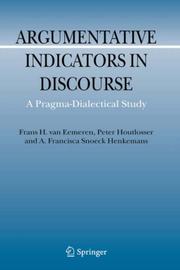
ISBN: 1402007035 9781402007033 904816057X 9401599483 Year: 2002 Volume: 6 Publisher: Dordrecht : Kluwer Academic,
Abstract | Keywords | Export | Availability | Bookmark
 Loading...
Loading...Choose an application
- Reference Manager
- EndNote
- RefWorks (Direct export to RefWorks)
In 1999 we invited a small number of colleagues to take part in a colloquium - voted to the analysis of argumentative discourse from two kinds of perspective: a dialectical and a rhetorical perspective. Our intention was to start a thorough disc- sion on the commonalities and differences between the two approaches. In this way we hoped to promote the development of analytic tools for dealing with argum- tation in which, in some way or other, the merits of both approaches are combined. The colloquium took place at the University of Amsterdam. In 2000 it was followed by a second colloquium at New York University, and in 2001 by a third one at Northwestern University. We are grateful to all three universities for giving us the chance to organize three exciting and fruitful meetings and we thank Eugene Garver, Eveline T. Feteris, M.A. van Rees, Ralph Johnson, A. Francisca Snoeck Hen- mans, Jose Plug, Bart Garssen, and Leah Polcar, who took part in the discussions but are not represented in this volume, for their critical and useful contributions.
Persuasion (Rhetoric) --- Dialectic. --- Reasoning --- Argumentation --- Dialectique --- Raisonnement --- #KVHA:Retoriek --- #KVHA:Argumentatie --- #KVHA:Dialectiek --- Persuasion (Rhetoric). --- Dialectic --- Rhetoric --- Forensics (Public speaking) --- Oratory --- Polarity --- Polarity (Philosophy) --- Philosophy. --- Social sciences. --- Linguistics. --- Philosophy, general. --- Social Sciences, general. --- Linguistics, general. --- Linguistic science --- Science of language --- Language and languages --- Behavioral sciences --- Human sciences --- Sciences, Social --- Social science --- Social studies --- Civilization --- Mental philosophy --- Humanities
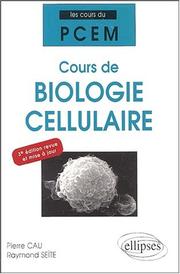
ISBN: 2729811389 Year: 2002 Publisher: Paris : Ellipses,
Abstract | Keywords | Export | Availability | Bookmark
 Loading...
Loading...Choose an application
- Reference Manager
- EndNote
- RefWorks (Direct export to RefWorks)
CELL BIOLOGY --- CELL MORPHOLOGY --- CELLS --- CELLS --- RESEARCH --- PLASMA MEMBRANE --- EXTRACELLULAR SPACES --- CELL COMMUNICATION --- CELLS --- CYTOSOL --- MITOCHONDRIA --- PEROXISOMES --- CYTOSKELETON --- CELL MEMBRANES --- CELL NUCLEUS --- NUCLEOLUS --- PROTEIN SYNTHESIS --- TEACHING MATERIALS --- FUNCTIONS --- BIOCHEMISTRY --- METHODS --- POLARITY --- CELL BIOLOGY --- CELL MORPHOLOGY --- CELLS --- CELLS --- RESEARCH --- PLASMA MEMBRANE --- EXTRACELLULAR SPACES --- CELL COMMUNICATION --- CELLS --- CYTOSOL --- MITOCHONDRIA --- PEROXISOMES --- CYTOSKELETON --- CELL MEMBRANES --- CELL NUCLEUS --- NUCLEOLUS --- PROTEIN SYNTHESIS --- TEACHING MATERIALS --- FUNCTIONS --- BIOCHEMISTRY --- METHODS --- POLARITY
| Listing 1 - 10 of 19 | << page >> |
Sort by
|

 Search
Search Feedback
Feedback About UniCat
About UniCat  Help
Help News
News